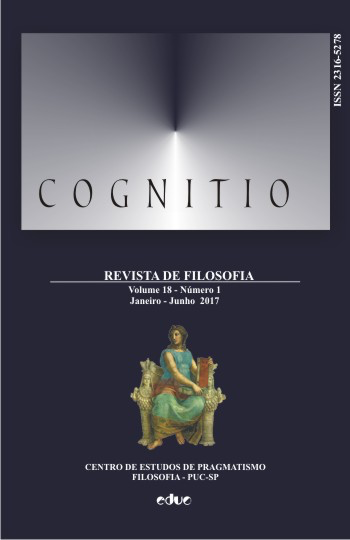A primeira filosofia naturalizada: o lugar de Peirce na tradição analítica
DOI:
https://doi.org/10.23925/2316-5278.2017v18i1p33-44Palavras-chave:
Peirce, Quine, Carnap, Primeira filosofia, Naturalismo,Resumo
A epistemologia de Charles Sanders Peirce parece paradoxal quando comparada a de Rudolf Carnap e W.V. Quine. Como Carnap, mas diferentemente de Quine, Peirce considera que o conhecimento científico reside em princípios lógicos que devem se sustentar para que o discurso sobre o verdadeiro e o falso tenha sentido. Ele também compartilha a visão de Carnap de que esses princípios são anteriores à, e independentes das constatações nas ciências naturais, uma visão que Quine notoriamente rejeita. Todavia, como Quine, mas diferentemente de Carnap, Peirce insiste que não há conhecimento além daquele que é obtido por meio de testes empíricos, que as verdades da lógica estão epistemologicamente a par das verdades descobertas nas ciências naturais, e que nos revelam algo sobre como as coisas são, em vez de carecerem de conteúdo fatual, como Carnap afirma. Um ar de paradoxo emerge no comprometimento simultâneo de Peirce às visões comumente consideradas próprias das teorias epistemológicas incompatíveis. A análise desse paradoxo pela comparação da concepção de conhecimento de Peirce ao de Quine e Carnap nos ajuda a apreciar melhor sua importância na tradição filosófica e na profundeza e originalidade de suas razões.Downloads
Publicado
2017-07-10
Como Citar
Forster, P. (2017). A primeira filosofia naturalizada: o lugar de Peirce na tradição analítica. Cognitio: Revista De Filosofia, 18(1), 33–44. https://doi.org/10.23925/2316-5278.2017v18i1p33-44
Edição
Seção
Artigos Cognitio









